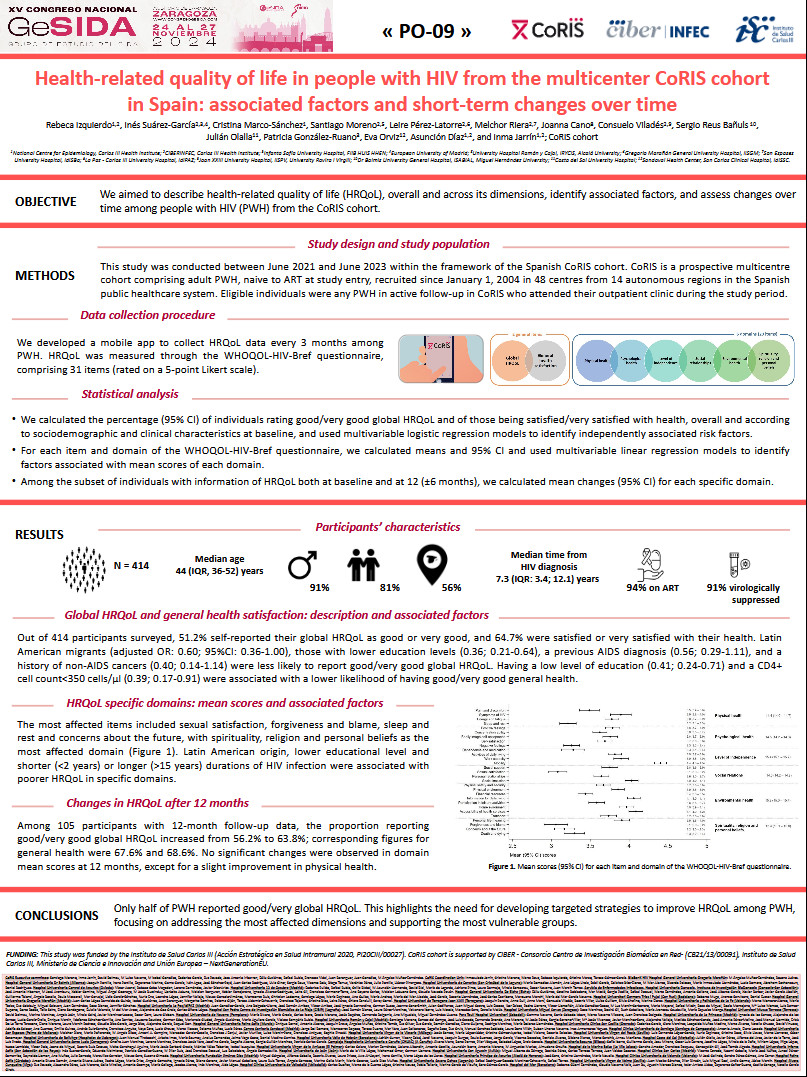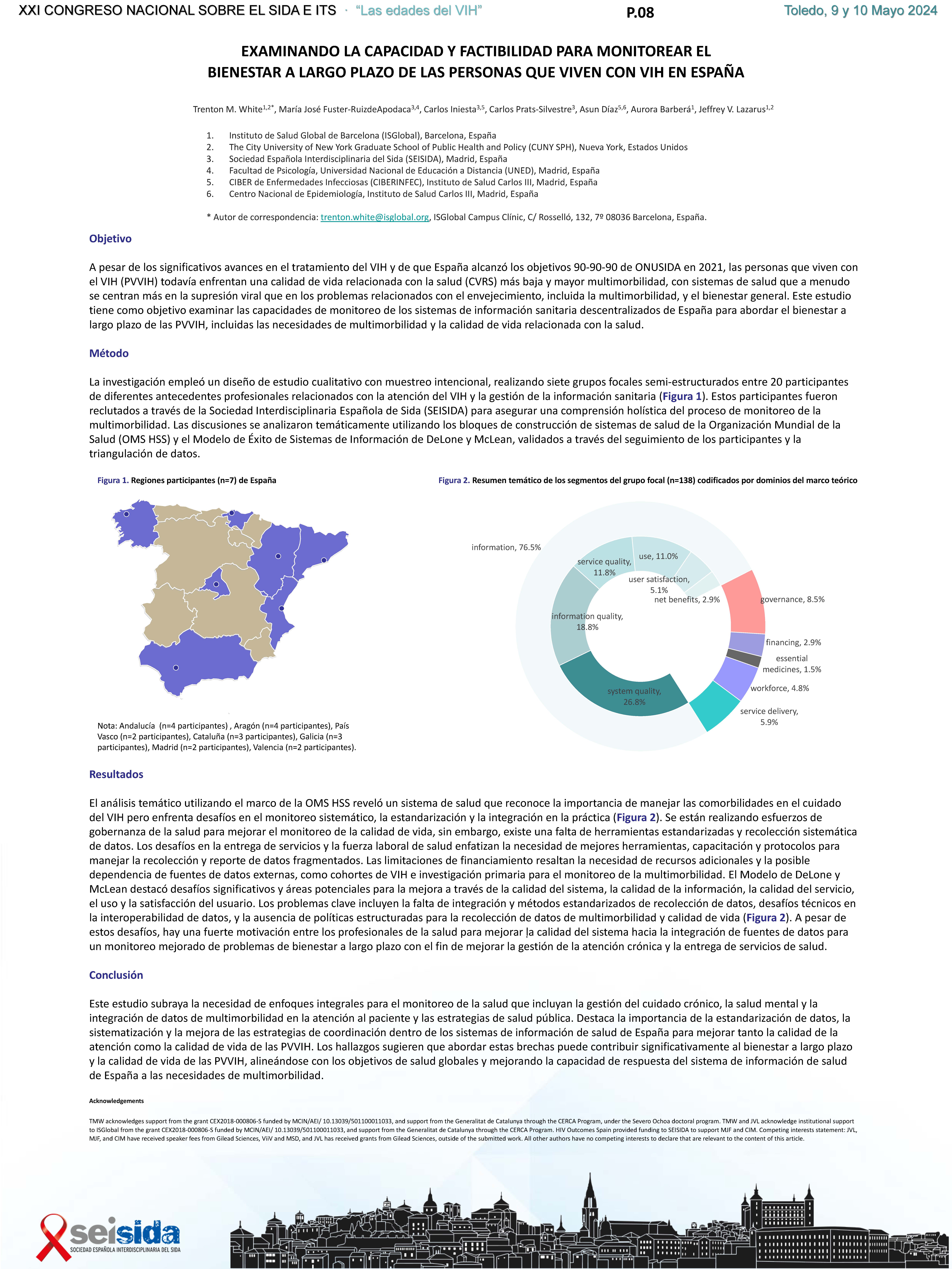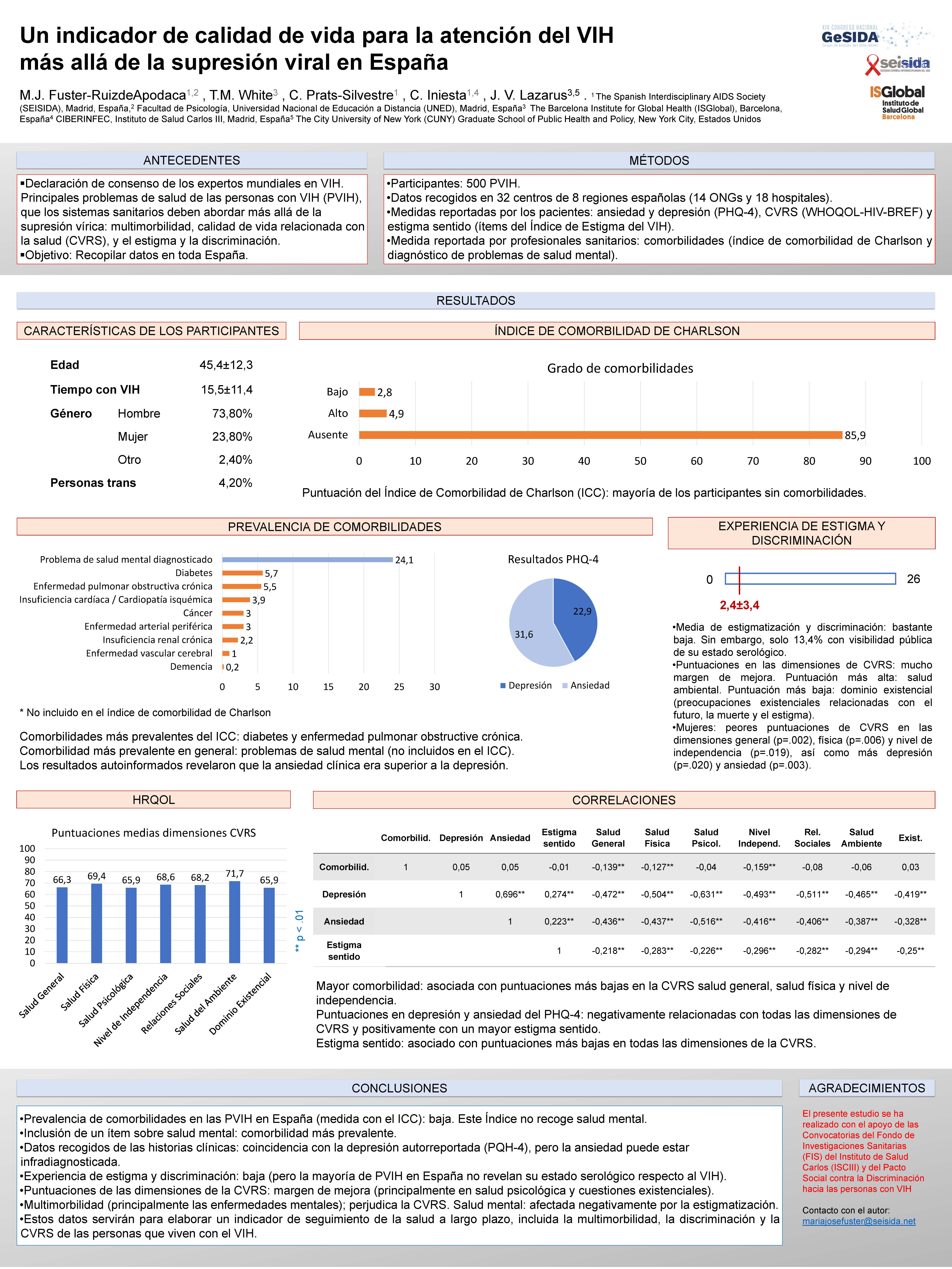Catálogo general VIH

Health-related quality of life in people with HIV from the multicenter CoRIS cohort in Spain: associated factors and short-term changes over time
Resumen
Objectives: We aimed to describe health-related quality of life (HRQoL), overall and across its dimensions, identify associated factors, and assess changes over time among people with HIV (PWH) from the CoRIS cohort. Methods: We developed a mobile app to collect HRQoL data every 3 months among PWH followed in CoRIS in 2021-2023. HRQoL was measured through the WHOQOL-HIV-Bref questionnaire, comprising 31 items (rated on a 5-point Likert scale): 1 on global HRQoL, 1 on health satisfaction and 29 covering 6 domains: physical health, psychological health, level of independence, social relationships, environmental health, and spirituality, religion and personal beliefs (SRPB). We calculated the proportion (95%CI) of participants reporting good/very good global HRQoL and general health and used multivariable logistic regression to identify associated factors. Mean (95%CI) scores for each item and domain were calculated, and multivariable linear regression was used to determine factors associated with mean domain scores. Changes in HRQoL at 12 months from baseline were also assessed. Results: Of 414 PWH included, 91.3% were male, median age was 43.9 (IQR: 36.2-51.6) years, 94.2% were on ART and 91.1% were virologically suppressed. Overall, 51.2% and 64.7% reported good/very good global HRQoL and general health, respectively. Latin American migrants (adjusted OR: 0.60; 95%CI: 0.36-1.00), those with lower education levels (0.36; 0.21-0.64), a previous AIDS diagnosis (0.56; 0.29- 1.11), and a history of non-AIDS cancers (0.40; 0.14-1.14) were less likely to report good/very good global HRQoL. Having a low level of education (0.41; 0.24-0.71) and a CD4+ cell count < 350 cells/µl (0.39; 0.17-0.91) were associated with a lower likelihood of having good/ very good general health. The most affected items included sexual satisfaction, forgiveness and blame, sleep and rest and concerns about the future, with SRPB as the most affected domain (Fig.). Latin American origin, lower educational level and shorter (< 2 years) or longer (> 15 years) durations of HIV infection were associated with poorer HRQoL in specific domains. Among 105 participants with 12-month follow-up data, the proportion reporting good/very good global HRQoL increased from 56.2% to 63.8%; corresponding figures for general health were 67.6% and 68.6%. No significant changes were observed in domain mean scores at 12 months, except for a slight improvement in physical health. Conclusions: Only half of PWH reported good/very global HRQoL. This highlights the need for developing targeted strategies to improve HRQoL among PWH, focusing on addressing the most affected dimensions and supporting the most vulnerable groups.
Autoría:
IZQUIERDO, Rebeca; SUÁREZ GARCÍA, Inés; MARCO SÁNCHEZ, Cristina; MORENO, Santiago; PÉREZ LATORRE, Leire; RIERA JAUME, Melcior; CANO, Joanna; VILADÉS LABORDA, Consuelo; REUS BAÑULS, Sergio; OLALLA SIERRA, Julián; GONZÁLEZ RUANO, Patricia; ORVÍZ GARCÍA, Eva; DÍAZ FRANCO, Asunción; JARRÍN VERA, Inmaculada
Autoría institucional: CoRIS (Cohorte de la Red de Investigación en Sida) (España)
Autoría institucional: CoRIS (Cohorte de la Red de Investigación en Sida) (España)
Ficha bibliográfica
- Año de publicación:
- 2024
- Descripción física:
- [1] p.
- Formato:
- Folleto
- Tipo de documento:
- Coloquios y ponencias
- Notas:
- Póster presentado en el XV Congreso Nacional Gesida celebrado en Zaragoza (España) del 24 al 27 de noviembre de 2024.
Contenidos relacionados
También te pueden interesar
-
Long-term health-related quality of life in people living with HIV who present to care with AIDS or severe immunodeficiency: the CoRIS AIDS survivors study
-
Examinando la capacidad y factibilidad para monitorear el bienestar a largo plazo de las personas que viven con VIH en España
-
Un indicador de calidad de vida para la atención del VIH más allá de la supresión viral en España





